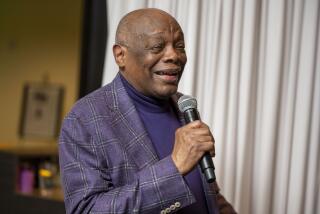George-Brown, Former British Official, Dies
- Share via
George Alfred Brown, whose erratic behavior and predilection for alcohol made him one of Britain’s more interesting public servants, is dead at age 70, his family announced Monday.
The former foreign minister who quaffed half a dozen drinks before lunch, who insulted his hosts on two continents and who fell on his face as he walked out of the House of Lords for the final time in 1976, had been hospitalized for internal hemorrhaging.
His brother, Ronald, said he had been ill for several months before he died in a Cornwall hospital on Sunday following surgery.
Known for His Antics
At his death he was Lord George-Brown; he hyphenated his given and surnames after being named a baron and admitted to the House of Lords in 1970. But from 1960 to 1970, when he was deputy Labor Party leader, and from 1966 to 1968, when he was foreign secretary under Prime Minister Harold Wilson, he was best known for his antics.
After his conviction for drunk driving in 1973, the pro-Labor Daily Mirror reflected that “the trouble about Mr. George-Brown is not that he drinks too much but that he shouldn’t drink all.”
Despite his eccentricities, he was a highly regarded Socialist leader who almost became prime minister in 1964, when he lost a close battle to Wilson for Labor leadership.
After he became foreign secretary, he helped move Britain into the European Common Market, participated in drafting the United Nations resolution that secured Arab-Israeli borders after the 1967 Six-Day War and carried a secret unsuccessful peace bid to Moscow during the Vietnam War.
‘Banana Skin Treatment’
But his achievements always seemed to be overshadowed by his public peccadilloes.
He told Israeli Prime Minister Golda Meir in 1970 that she was “only a Jewess from Russia who came to Israel via America;” told Nikita S. Khrushchev that he should seek “God’s forgiveness” for stating that the Allies had left Russia to the mercy of Adolf Hitler during World War II, and once ordered the British ambassador to Israel to “shut up.”
“Life had the habit of giving him the banana skin treatment at moments of crisis,” the Daily Express once editorialized.
George-Brown was the son of a truck driver who at age 8 was delivering handbills for Labor Party candidates. During his youth he worked as a fur salesman, but he spent most of his time at union meetings where he met Sophie Levene. They were married in 1927 and had two daughters.
In 1945 he was elected to the House of Commons from Belper and by 1964 had become the minister for economic affairs and the architect for a national economic plan that made him popular enough to challenge Wilson for party leadership. But he was considered more conservative than Wilson and lost the support of the left-wing of the party.
Quit Party in 1976
He quit Wilson’s Cabinet in 1968 in a philosophical dispute and the Labor Party itself in 1976 after an emotional speech in the House of Lords in which he described a televised interview he had seen of exiled Soviet author Alexander I. Solzhenitsyn. The program convinced him, he said, that he “must stand up and do something” to champion human freedom.
Moments later he walked out of the House of Lords and fell flat on his face in the street.
“I knew this would happen,” he was heard to say as he got up.
More to Read
Sign up for Essential California
The most important California stories and recommendations in your inbox every morning.
You may occasionally receive promotional content from the Los Angeles Times.










